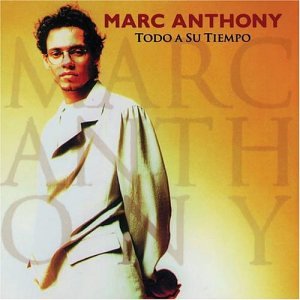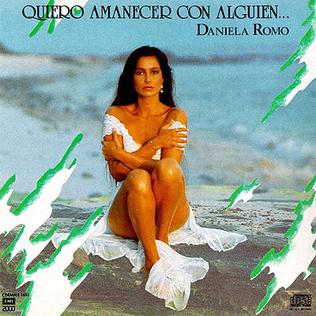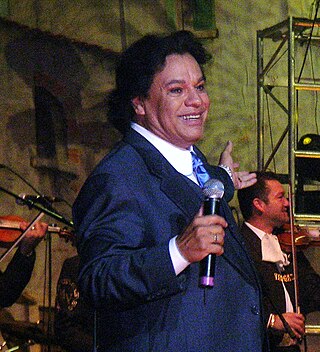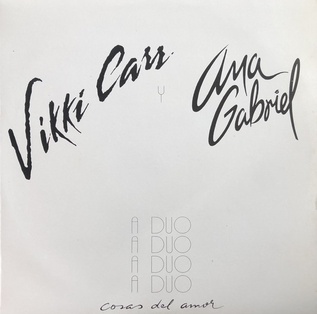Related Research Articles

María Guadalupe Araujo Yong, better known as Ana Gabriel, is a Mexican singer and songwriter from Guamuchil, Sinaloa, Mexico. She first sang on the stage at age six, singing "Regalo A Dios" by José Alfredo Jiménez. She moved to Tijuana, Baja California and studied accounting. At age 21, in 1977, she recorded her first song, titled "Compréndeme". During her long career, she has hits in three different genres of music: Latin pop and Mariachi.

Daniela Romo is a Mexican singer, actress and TV hostess. During her career, she has sold 17 million records, making her one of the best-selling Latin music artists.

Todo a Su Tiempo is the second studio album by American recording artist Marc Anthony, released by RMM Records on May 31, 1995. The album was produced by Sergio George, who was also involved with production of Anthony's debut studio album, Otra Nota. The album comprises five new compositions, three of which were written by Omar Alfanno, and four cover versions. Eight singles were released from the album, all but one of which topped the Billboard Tropical Songs chart.

Quiero Amanecer con Alguien is the 6th studio album by Mexican pop singer Daniela Romo. This album was released on 1989 and was nominated for Pop Album of the Year at the Lo Nuestro Awards, this was a departure from the catchy pop nature of her previous albums, adopting a serious image, and concentrated mainly on ballads.

Amada más que nunca is the seventh studio album by Mexican pop singer Daniela Romo. This album was released on 1991. The album received a Grammy Award nomination for Best Latin Pop Performance, which it lost to Vikki Carr's Cosas del Amor; and was also nominated for Pop Album of the Year at the Lo Nuestro Awards of 1992 and it is her most successful album to date.
"De Mí Enamórate" is a ballad written by Mexican singer-songwriter Juan Gabriel, and performed by Mexican singer-songwriter and actress Daniela Romo. The song was produced by Gian Pietro Felisatti and co-produced by Miguel Blasco. It was released as the first single from her fourth studio album Mujer de Todos, Mujer de Nadie (1986).
"¡Ay, Amor!" is a ballad written and performed by Mexican singer-songwriter Ana Gabriel and produced by Mariano Pérez Bautista. It was released as the first single from her third studio album, Pecado Original (1987). This song became the second to spend 14 consecutive weeks at number one in the Billboard Hot Latin Tracks chart, after fellow Mexican singer Daniela Romo with "De Mí Enamórate", being surpassed in the same year by Yuri when her single "Qué Te Pasa" achieved sixteen weeks at the top of the chart.
"Y Ahora Te Vas" is a song written and produced by Mexican singer-songwriter Marco Antonio Solís, and performed by him as the lead singer of Los Bukis. It was released as the second single from his 11st Grammy nominated studio album Si Me Recuerdas (1988). This song became their first number-one single in the Billboard Hot Latin Tracks chart.
"Qué Te Pasa" is a dance song written by J.R. Florez and Gian Pietro DiFelissati, produced by Felissatti and performed by Mexican singer Yuri. It was released in 1987 as the first single from her seventh studio album Aire (1987), and became her first number-one single in the Billboard Hot Latin Tracks chart and won the Lo Nuestro Award for Pop Song of the Year in 1989.

Dejarte de Amar is the second studio album recorded by Mexican pop rock band Camila, It was released by Sony Music Latin on February 9, 2010 Produced by band leader Mario Domm and mostly written by Domm and Mónica Velez, the album became a success in the United States and Mexico. The album was certified Disco Platino in the United States by the RIAA and 4× Platinum in Mexico by AMPROFON. It was recorded in Mexico at Mamita Studio with theme about love, loneliness and lies. The album spawned three singles: "Mientes", "Aléjate de Mi", and "Bésame", all of which reached number-one on the Billboard Latin Pop Airplay chart. The album received generally positive reviews for its arrangements and compositions.

The year-end charts for the Hot Latin Songs chart are published in the last issue of Billboard magazine every year. Initially, the chart was based on information provided by Nielsen Broadcast Data Systems, which collected airplay information from Latin radio stations in the United States. On the week ending October 20, 2012, the methodology was changed to track the best-performing Spanish-language songs based on digital downloads, streaming activity, and airplay from all radio stations in the country. The Year-End charts represent aggregated numbers from the weekly charts that were compiled for each artist, song and record company.
"Quién Como Tú" is a ballad and title track written and performed by Mexican singer-songwriter Ana Gabriel. It was produced by Óscar Gómez for Gabriel's fifth studio album Quién como tú (1989). Released as the second single from the album, the song became the third number-one single for the singer in the Billboard Top Latin Songs chart in May of the same year. Live performances of the song can be found on the albums En Vivo (1990) and ...En la Plaza de Toros México (1998).

"Es Demasiado Tarde" is a song written and performed by Mexican singer-songwriter Ana Gabriel. It was released in 1990 by CBS Records and first included on the compilation album México, Voz y Sentimiento which also featured songs performed by Luis Angel, Vikki Carr, Aida Cuevas, Lorenzo de Monteclaro, Antonio De Jesús, Pedro Fernández, Hermanas Huerta, Tania Libertad, Angelica Maria, Lucía Méndez, Angeles Ochoa, Gilberto Parra, Gerardo Reyes, Cuco Sánchez, Cecilia Toussaint, Yuri and Flor Yvon. The song became Gabriel's fourth number-one single in the Billboard Top Latin Songs chart, after "Ay Amor", "Simplemente Amigos" and "Quién Como Tú". Personalidad: 20 Éxitos was the first Gabriel album to include the song. "Es Demasiado Tarde" is a song about a woman who refuses to take her lover back after the end of their relationship. Gabriel also addressed this issue in her song "Tú lo Decidiste" in 1994. The song earned the Lo Nuestro Award for Best Pop Song.
"Mi Deseo" is a song written, produced and performed by Mexican singer-songwriter Marco Antonio Solís as the lead member of the band Los Bukis. It was released by Fonovisa Records on February 11, 1991 as the lead single from his 13rd studio album A Través de Tus Ojos (1991). The song became their third number-one single in the Billboard Top Latin Songs chart, after "Y Ahora Te Vas" and "Cómo Fuí a Enamorarme de Tí".

"Cosas del Amor" is a song by American recording artist Vikki Carr and Mexican singer-songwriter Ana Gabriel. It was released as the lead single from Carr's studio album Cosas del Amor (1991). Written by Roberto Livi and Rudy Pérez, the song portrays the relationship between two friends and confidences between both due to marital problems of one of them.
"Amor Mío, ¿Qué Me Has Hecho?" is a song performed by Spanish singer-songwriter Camilo Sesto. It was released as the lead single from his 19th studio album A Voluntad del Cielo (1991). The song was written and produced by Camilo Blanes with additional production by Augusto César and became Sesto's first number-one hit in the Billboard Hot Latin Tracks chart.
"Detrás de Mi Ventana" is a Latin pop song by Mexican recording artist Yuri from her studio album Nueva Era (1993). The track was written by Guatemalan singer-songwriter Ricardo Arjona. It was released as the lead single in Latin America and the United States, peaking atop the Billboard's Latin Songs chart, becoming the third number-one song in the chart for the singer and the first for Arjona as a songwriter.
The 3rd Lo Nuestro Awards ceremony, presented by Univision honoring the best Latin music of 1990 and 1991 took place on May 23, 1991, at a live presentation held at the James L. Knight Center in Miami, Florida. The ceremony was broadcast in the United States and Latin America by Univision.
The 4th Lo Nuestro Awards ceremony, presented by Univision honoring the best Latin music of 1991 and 1992 took place on May 14, 1992, at a live presentation held at the Caesars Palace in Las Vegas, Nevada. The ceremony was broadcast in the United States and Latin America by Univision.
References
- ↑ "Daniela Romo — Chart History". Billboard. Retrieved February 15, 2011.
- ↑ "Ana Gabriel leads nominees for Latin Music Awards". Billboard . Vol. 104, no. 13. Nielsen Business Media, Inc. March 28, 1992.
- ↑ "Lo Nuestro 1992 — Historia" (in Spanish). Univision Communications, Inc. 1991. Retrieved February 15, 2011.
- ↑ "Billboard awards back on FBC with new global reach". The Hollywood Reporter . Prometheus Global Media. 319 (34–50): 110. 1991.
- ↑ "Todo, Todo, Todo — Week of May 25, 1991". Billboard. May 25, 1991. Retrieved February 15, 2011.
- ↑ "Todo, Todo, Todo — Week of June 8, 1991". Billboard. June 8, 1991. Retrieved February 15, 2011.
- ↑ "Todo, Todo, Todo — Week of June 22, 1991". Billboard. June 22, 1991. Retrieved February 15, 2011.
- ↑ "Cosas del Amor — Week of August 31, 1991". Billboard. August 31, 1991. Retrieved February 15, 2011.
- ↑ "Topping The Charts Year By Year". Billboard. Vol. 110, no. 48. Nielsen Business Media, Inc. November 28, 1998. p. LMQ3. Retrieved February 15, 2011.